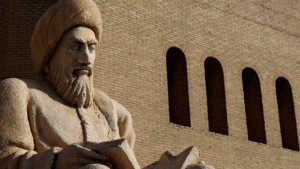The Islamic Golden Age: A Period of Intellectual and Cultural Growth
Muslim scholars and scientists made significant contributions to various fields of study from the 8th century to the 14th century. The teachings of the Quran and the Hadiths emphasized the importance of knowledge and encouraged Muslims to seek it out, which inspired many scholars during this time.

Advancements in Mathematics, Science, and Literature
One of the most significant contributions of the Islamic Golden Age was in the field of mathematics. Muslim mathematicians developed algebra and made advances in geometry and trigonometry. They also made significant contributions to the fields of astronomy, medicine, and literature, among others.
The Contributions of Al-Farabi
Al-Farabi, born in 870 CE in what is now Kazakhstan. He was a philosopher, logician, and musician who lived in Baghdad and Aleppo during the Islamic Golden Age. Al-Farabi incorporated Aristotelian philosophy into his own works and made significant contributions to philosophy, political science, and music theory. He wrote over 100 works, including his famous “The Virtuous City,” which discussed the ideal society and the role of the philosopher in politics.
Ibn Rushd’s Influence on Western Philosophy
Ibn Rushd, born in 1126 CE in what is now Cordoba, Spain, was a philosopher, jurist, and physician who lived during the Islamic Golden Age. He was known in the West as Averroes and made significant contributions to philosophy, logic, and medicine. Ibn Rushd’s works were influential in shaping the development of Western philosophy, particularly during the Renaissance.
Ibn Sina’s Polymathic Achievements
Ibn Sina, born in 980 CE in what is now Uzbekistan, was a polymath who made significant contributions to fields such as medicine, philosophy, astronomy, and logic. He wrote the medical encyclopedia “The Canon of Medicine,” which became a standard medical textbook in Europe for centuries. Ibn Sina’s philosophy incorporated Aristotelian and Neoplatonic thought and was influential in both the Islamic and Western philosophical traditions.
Al-Ghazali’s Impact on Islamic Thought
Al-Ghazali, born in 1058 CE in what is now Iran, was a philosopher and theologian who is known as “The Proof of Islam.” Al-Ghazali’s works on Islamic theology, philosophy, and Sufism had a significant impact on Islamic thought and continue to be influential today. His works “The Incoherence of the Philosophers” and “The Revival of the Religious Sciences” are still widely read and studied in the Islamic world.
Recognizing the Achievements of Islamic Scholars
In conclusion, the Islamic Golden Age was a time of great intellectual and cultural growth. Muslim scholars and scientists made significant contributions to various fields of study, and their works have had a lasting impact on human knowledge and understanding. It is important to recognize the achievements of scholars like Al-Farabi, Ibn Rushd, Ibn Sina, and Al-Ghazali and their contributions to philosophy, science, and other fields during the Islamic Golden Age.
Don’t miss out on our upcoming blogs about each of these scholars and their works. Subscribe to Quranforu newsletter for a more detailed discussion of their lives and contributions.
